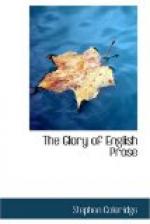31
MY DEAR ANTONY,
Like the author of the Peninsular War, Sir William Butler was great both as a soldier and as a writer. His autobiography sparkles with humour, irony, and felicitous diction; but it was in his Life of Gordon of Khartoum that he rose to his full stature as a contributor to the glory of English prose.
The spell of Gordon seems to have, as it were, transfigured all who approached him, and raised them out of themselves. One man alone, of all those whose lives touched his, has shown that his own pinched and narrow mediocrity was proof against the radiance of Gordon’s spirit, and has feebly attempted to belittle the soldier saint for his own justification. But he has failed even to project a spot upon the sun of Gordon’s fame, and he is already forgotten, while the great soldier’s name will endure in the hearts of his countrymen till England and its people fail.
If Sir William Butler’s final noble periods, which I here reproduce, do not deeply move him who reads them, then must that reader have a heart of stone:—
“Thus fell in dark hour of defeat a man as unselfish as Sidney, of courage dauntless as Wolfe, of honour stainless as Outram, of sympathy wide-reaching as Drummond, of honesty straightforward as Napier, of faith as steadfast as More. Doubtful indeed is it if anywhere in the past we shall find figure of knight or soldier to equal him, for sometimes it is the sword of death that gives to life its real knighthood, and too often the soldier’s end is unworthy of his knightly life; but with Gordon the harmony of life and death was complete, and the closing scenes seem to move to their fulfilment in solemn hush, as though an unseen power watched over the sequence of their sorrow.
“Not by the blind hazard of chance was this great tragedy consummated; not by the discord of men or from the vague opposition of physical obstacle, by fault of route or length of delay, was help denied to him. The picture of a wonderful life had to be made perfect by heroic death. The moral had to be cut deep, and written red, and hung high, so that its lesson could be seen by all men above strife and doubt and discord. Nay, the very setting of the final scenes has to be wrought out in such contrast of colour that the dullest eye shall be able to read the meaning of it all. For many a year back this soldier’s life has been a protest against our most cherished teaching. Faith is weakness, we have said. He will show us it is strength. Reward is the right of service. Publicity is true fame. Let us go into action with a newspaper correspondent riding at our elbow, or sitting in the cabin of the ship, has been our practice. He has told us that the race should be for honour, not for ‘honours,’ that we should ’give away our medal,’ and that courage and humility, mercy and strength, should march hand in hand




